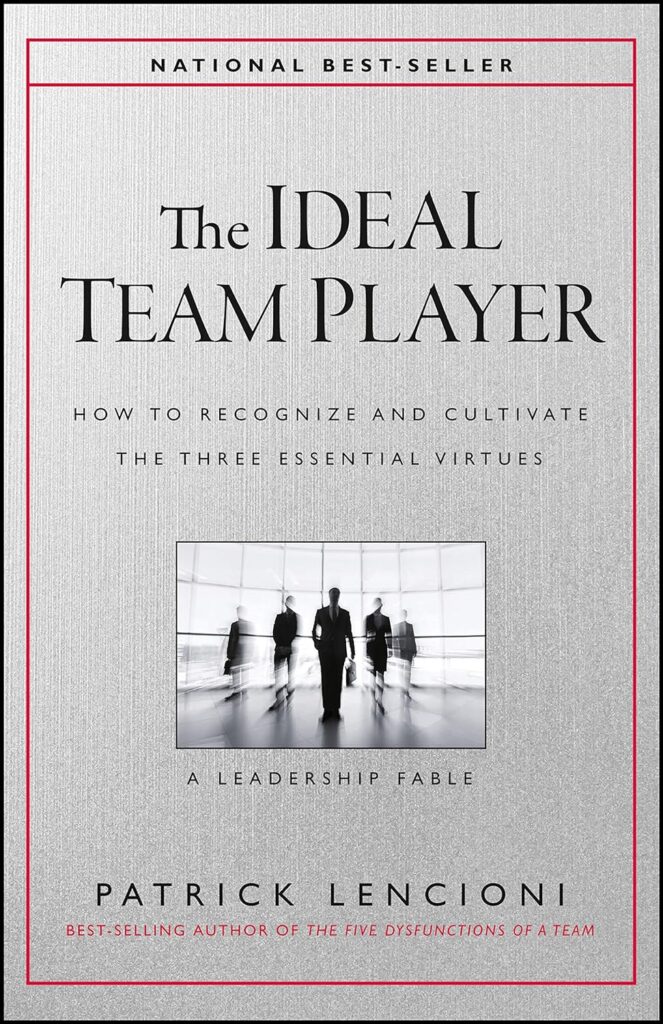Have you ever been part of a team where everything just clicked? Where everyone seemed to be on the same page, working together seamlessly, and achieving great results? Or maybe you’ve been on the other side of that experience, stuck in a team where nothing seemed to go right, and you couldn’t quite figure out why. I’ve been in both situations, and it left me wondering—what exactly makes a team work? That’s where “The Ideal Team Player” by Patrick Lencioni comes into play. This book dives deep into the qualities that make someone an exceptional team player, and it turns out that the answer is both simple and profound.
1. The Three Virtues: Humble, Hungry, and Smart
When I first started reading “The Ideal Team Player,” I wasn’t sure what to expect. We all know that teamwork is important, but Lencioni simplifies the formula for success into three key virtues: humble, hungry, and smart. At first glance, these might seem like buzzwords, but they’re anything but that. These virtues are the foundation of what makes someone an ideal team player, and they’re surprisingly relatable when you break them down.
Humble: Humility is all about putting the team’s success ahead of your own. It means being willing to share credit, admit mistakes, and not let your ego get in the way. I’ve seen firsthand how a lack of humility can derail a team. When someone is more focused on their own achievements than on the team’s goals, it creates tension and resentment. On the flip side, humility fosters trust and collaboration.
Hungry: This is the drive to go above and beyond, to be passionate about your work and always strive for more. Hunger isn’t just about working long hours; it’s about having that internal fire that pushes you to excel. I’ve worked with people who are incredibly driven, and their energy is contagious. When you’re surrounded by team members who are hungry, it pushes everyone to perform at their best.
Smart: This isn’t about IQ or technical skills; it’s about emotional intelligence. Being smart in the context of a team means being aware of how your actions and words impact others. It’s about reading the room, understanding dynamics, and communicating effectively. I’ve realized that some of the most “intelligent” people I’ve worked with aren’t necessarily the ones with the highest degrees, but those who know how to navigate relationships and keep the team moving forward.

2. The Power of Combining the Virtues
Now, here’s where things get interesting. It’s not enough to just have one or two of these virtues—you need all three to truly be an ideal team player. I found this concept fascinating because it explains why some people, despite being highly talented or hardworking, still struggle to fit into a team.
Imagine someone who’s hungry and smart but lacks humility. They might be a top performer, but if they’re always focused on their own success, they’re not going to be the best team player. Or consider someone who’s humble and smart but lacks hunger. They might be great to work with, but they won’t push the team to new heights. And finally, someone who’s humble and hungry but not smart might mean well, but their lack of emotional intelligence could cause misunderstandings and conflicts.
What I’ve realized is that these virtues are like the legs of a stool—if one is missing, the whole thing falls apart. But when they’re all present, you’ve got a solid foundation for a strong, cohesive team.
3. Recognizing and Developing the Virtues
So how do you recognize these virtues in yourself and others? And more importantly, how do you develop them? This is where “The Ideal Team Player” really hits home for me. Lencioni offers practical advice on how to assess these virtues in potential team members and how to cultivate them within existing teams.
One of the most eye-opening exercises for me was the idea of self-reflection. Taking a hard look at myself, I had to ask—am I truly humble? Am I hungry enough? Do I have the emotional intelligence needed to be smart in a team setting? It’s not always easy to be honest with yourself, but it’s essential for growth.
Lencioni also emphasizes the role of leadership in developing these virtues. Leaders set the tone for the team, and if they embody humility, hunger, and smarts, it naturally encourages others to do the same. But it’s not just about leading by example; it’s also about creating an environment where these virtues are valued and rewarded. I’ve seen how a positive culture can bring out the best in people, and how a toxic one can do the exact opposite.
4. The Real-World Impact
“The Ideal Team Player” isn’t just theory—it’s incredibly practical. As I read through the book, I couldn’t help but think about how these virtues play out in real-world situations. Whether it’s in a corporate setting, a sports team, or even a group project at school, the principles are universally applicable.
I’ve started to notice how these virtues—or the lack thereof—affect the teams I’m part of. When someone is humble, hungry, and smart, they stand out. They make the team stronger, more cohesive, and more successful. On the other hand, when one of these virtues is missing, it’s like there’s a weak link in the chain.
But what really struck me is how these virtues go beyond just being good for the team—they’re good for the individual too. By focusing on being humble, hungry, and smart, I’ve found that I’m not just a better team player, but I’m also more fulfilled in my work. There’s something incredibly satisfying about contributing to a team in a meaningful way and knowing that you’re making a positive impact.
Conclusion: Are You the Ideal Team Player?
Reading “The Ideal Team Player” has changed the way I think about teamwork. It’s made me more aware of the qualities that truly matter, and it’s challenged me to be a better team player. But it’s also left me with some questions. How well do I embody these virtues? And how can I help others develop them too?
So, what about you? Do you have what it takes to be the ideal team player? And if not, what steps can you take to get there? The answers might just change the way you approach teamwork—and life—forever.




